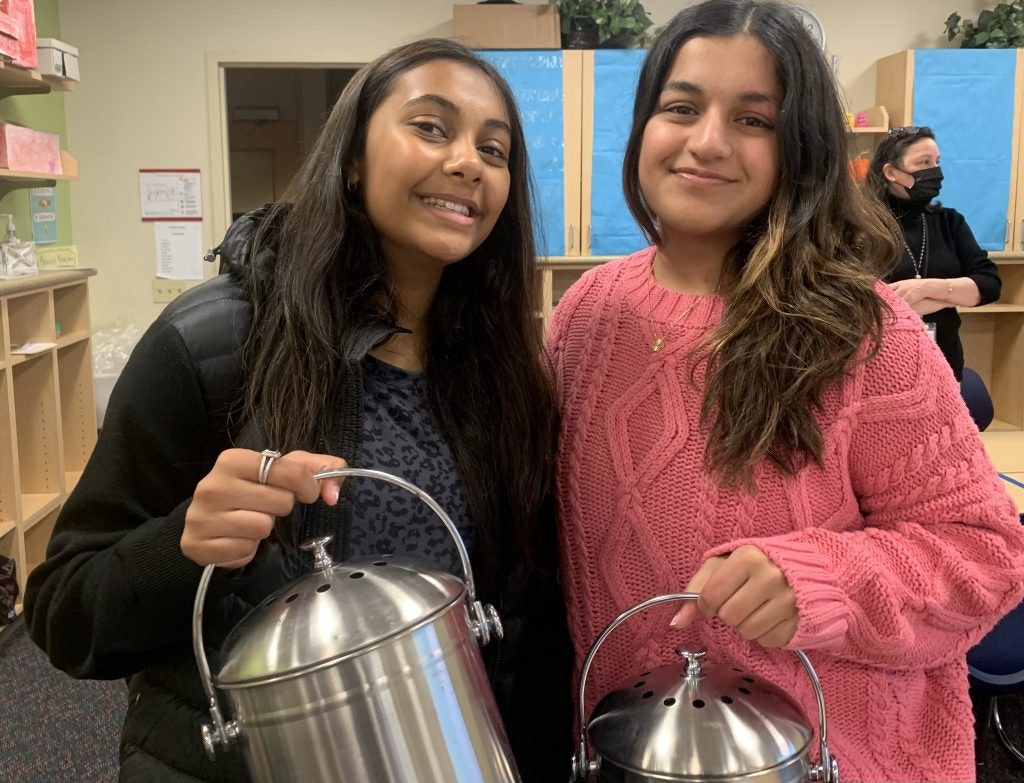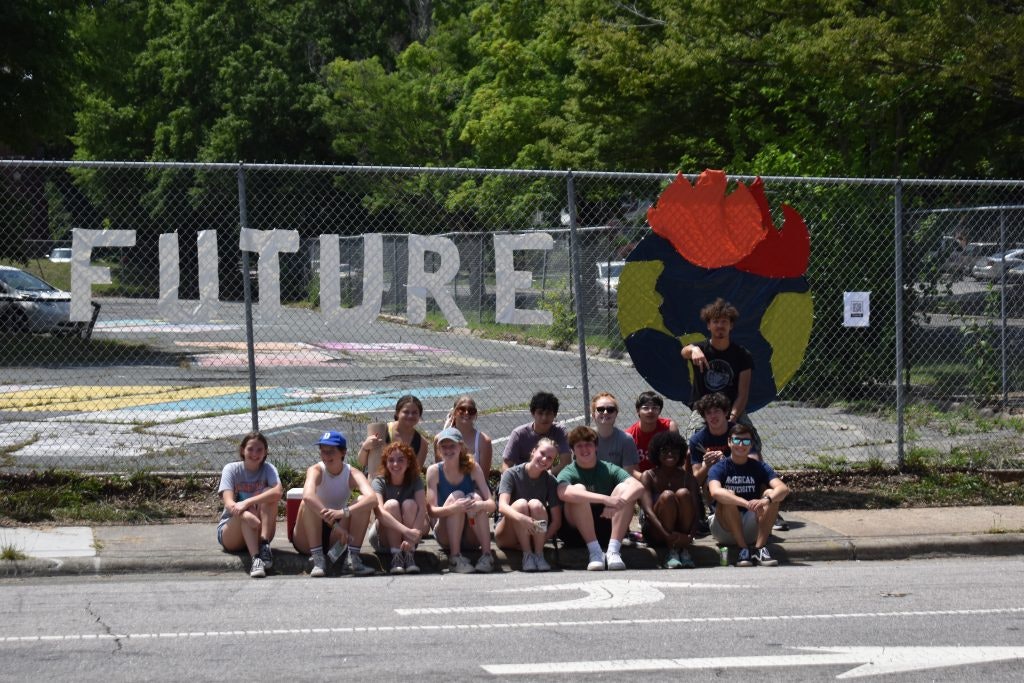Julia Masuda brought a special umbrella to her high school in Yokohama, Japan to draw attention to a problem in her country. Frequent pop-up storms make it difficult to know when you need an umbrella, so it’s common in Japan to buy cheap ones when needed and then leave them behind in the city.
“In Japan it’s a huge problem. Umbrellas are a super-accessible convenience, and people throw them away or leave them on the ground. There are a bunch of umbrellas around the streets,” Masuda said.
The result – Japan’s Umbrella Promotion Association estimates that between 120 million and 130 million umbrellas are consumed every year in Japan. It has created a waste problem that Masuda focused on during her latest project with the Climate Leaders Fellowship program. She promoted the recycling of ziploc bags to make rental umbrellas produced by the companies AsahiKASEI and TerraCycle.

Julia Masuda and her fellow students made a recycling bin for Ziploc bags in Yokohama, Japan.
She also served as a student leader for the online program offered free of charge by the Stanford University Center for Deliberative Democracy and the Rustic Pathways Foundation. Masuda participated in the inaugural program that focused on natural disasters in the fall of 2021, and then she joined the second round in the Spring of 2022 that centered on waste management problems.
“In Japan there’s always a clash between sustainability and things being aesthetically pleasing. We are known for clean bathrooms and great packaging,” Masuda said. “But when you look at it from a sustainable aspect it is the opposite of sustainable where we are using layers of plastic… but I slowly see a shift.”
This includes the increased use of reusable bags and other measures. Promoting such progress is the goal of the fellowship program. It has educational sessions where moderators teach students about environmental sustainability, along with methods to encourage better practices. Each student then designs a project customized to their community’s needs and joins in sessions with other participants from around the world to share ideas.
The Spring 2022 round of the fellowship program included 94 students from countries ranging from Malaysia and the United Kingdom to the Dominican Republic and the United States.
A Large Diversity of Projects
Students looked at waste management in a broad sense, allowing them to work on a large range of projects. This included efforts aimed at composting, recycling and the reduction of plastic use.
Amita Akshinthala from Plainsboro, New Jersey centered on problems related to cheap, fast fashion. This allowed her to address wider issues, including labor practices.
“I wanted to do something that would affect the youth in my community – so people my age and people in my grade,” Akshinthala said. “When I chose to make a website for fast fashion I thought about how many people in my generation and other generations buy from fast fashion brands and how harmful that could be not only to the environment but also economically and from a human rights aspect.”
Akshinthala did a school presentation that looped in the environmental club to spread the word about the problems with fast fashion. On her website, she gave even more information. Among the facts she shared:
- 342 million barrels of oil are used each year to produce synthetic fibers
- 33% of all microplastics are from synthetic materials
- 57% of all discarded clothes end up in a landfill
Amita Akshinthala created a website to explain the problems with fast fashion during the Climate Leaders Fellowship program.
Akshinthala admits it is a tough sell with teens since fast fashion is cheap and often allows young people to follow certain fashion trends. However, she plans to continue her efforts in the fall, including writing about it for the school newspaper. She also hopes to spread the word beyond her local community.
“It’s fine to start in your own circle because that’s what you know, but at the same time when entering the fellowship you have to keep in mind that your project should be something that will expand onto the global level,” Akshinthala said “The point of this is to not only care about the environment but also to care about the global community.”
For nearly all the students, their local projects were ones that could be implemented in many places around the world. A focus on composting, for example, was a popular concept. Three students who included composting efforts in their projects were Marin Peale from Arlington, Virginia, Neha Sarwal from Melville, New York and Sanjay Kumar from Johor, Malaysia.
Peale worked to promote composting in her local middle school. She says her student cohort in the fellowship program gave her some good ideas that made her project work, including conducting a spin board game with candy to get the local students interested in participating.
“Someone in the group suggested candy, which was helpful,” Peale said. “I also got advice on making a logo for the compost bin – one with very colorful infographics that were not wordy.”
Peale says the middle school students were really receptive, and she successfully collected compost at their lunches once a week. This coming school year the goal is to increase that to two days a week and to encourage middle school leaders to help with the project.
Sarwal says she did not know what a compost system was until she learned about it in high school. In her area in New York, the elementary school had a compost program until Covid came along. Sarwal helped reinstate it. She says the kids were really excited to put their leftover fruits and vegetables in the bins during snack time.

Neha Sarwal and her fellow students promote the use of compost bins at the lower school of Friends Academy in Locust Valley, New York.
For Kumar and his student team in Malaysia, composting was just one aspect of their efforts. They also did a bake sale to raise money for climate organizations and did a clothing drive.
“It was amazing. I was an introvert, but I got to communicate with people from other countries,” Kumar said. “It got me out of my comfort zone, and the other students had a bunch of good ideas.”
Aside from ideas, the students also had time for social gatherings. Masuda led an online origami workshop and other students held cooking sessions. It was a great way to connect with each other on a more personal level.
Ella Perin from Durham North Carolina said it was interesting to get different perspectives depending on where people lived. She says her area is farther along than others in terms of efforts such as composting and recycling. Instead, she worked with other students on a general environmental awareness campaign that involved creating a mural with a QR code that sent people to links with sustainability information.

Ella Perin and her classmates made a display to draw attention to environmental issues.
She says the fellowship program works well for students from different communities with varying knowledge levels.
“You don’t have to know much about climate change and activism to join,” Perin. “If you are just starting, it’s a great introduction, but if you are already involved, it’s also a great way to motivate you. Either way, it’s inspirational hearing other people’s ideas and see them doing their best… I would definitely recommend it to everyone who wants to help.”
Our next fellowship round launches in October. Applications are being accepted beginning on August 15. For more information, please visit our Climate Leaders Fellowship website.
